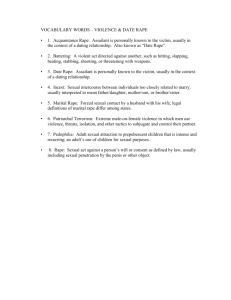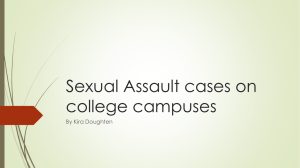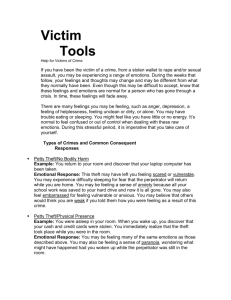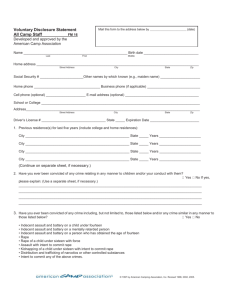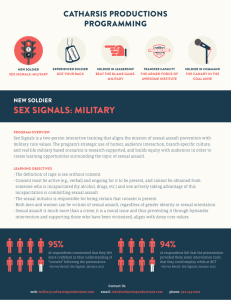sILLINOIS STATE UNIVERSITY
advertisement
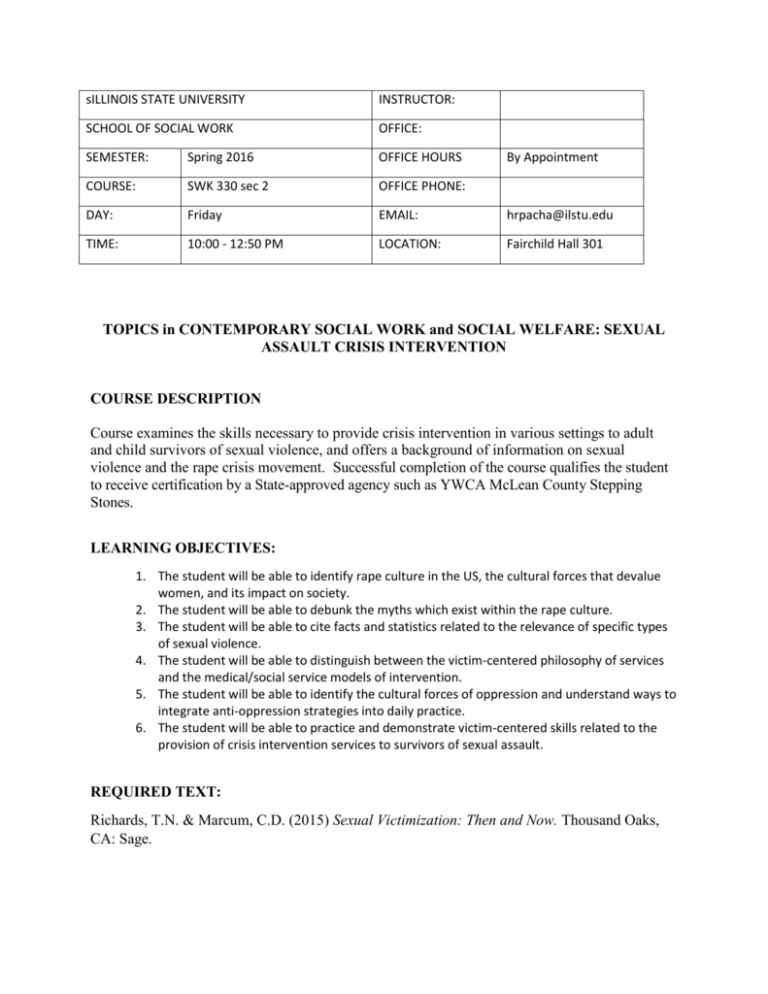
sILLINOIS STATE UNIVERSITY INSTRUCTOR: SCHOOL OF SOCIAL WORK OFFICE: SEMESTER: Spring 2016 OFFICE HOURS COURSE: SWK 330 sec 2 OFFICE PHONE: DAY: Friday EMAIL: hrpacha@ilstu.edu TIME: 10:00 - 12:50 PM LOCATION: Fairchild Hall 301 By Appointment TOPICS in CONTEMPORARY SOCIAL WORK and SOCIAL WELFARE: SEXUAL ASSAULT CRISIS INTERVENTION COURSE DESCRIPTION Course examines the skills necessary to provide crisis intervention in various settings to adult and child survivors of sexual violence, and offers a background of information on sexual violence and the rape crisis movement. Successful completion of the course qualifies the student to receive certification by a State-approved agency such as YWCA McLean County Stepping Stones. LEARNING OBJECTIVES: 1. The student will be able to identify rape culture in the US, the cultural forces that devalue women, and its impact on society. 2. The student will be able to debunk the myths which exist within the rape culture. 3. The student will be able to cite facts and statistics related to the relevance of specific types of sexual violence. 4. The student will be able to distinguish between the victim-centered philosophy of services and the medical/social service models of intervention. 5. The student will be able to identify the cultural forces of oppression and understand ways to integrate anti-oppression strategies into daily practice. 6. The student will be able to practice and demonstrate victim-centered skills related to the provision of crisis intervention services to survivors of sexual assault. REQUIRED TEXT: Richards, T.N. & Marcum, C.D. (2015) Sexual Victimization: Then and Now. Thousand Oaks, CA: Sage. EXPECTATIONS OF STUDENTS Attendance and Participation: Students are expected to attend and participate in all class sessions. A student should not be enrolled in a course if other obligations will interfere with getting to class sessions regularly and punctually. More than two absences will result in a lowered grade. Repeated tardiness or leaving class early also will result in a lowered grade. If a student misses a class, he or she will be responsible for any missed class content. Missed in-class work or points generally cannot be made up. Students who experience the death of an immediate family member or relative as defined in the University Student Bereavement Policy will be excused from class for funeral leave, subsequent bereavement, and/or travel considerations. Students are responsible for providing appropriate documentation to the Dean of Students office and for contacting the instructor as soon as possible to make arrangements for completing missed work. More information is available in the Student Bereavement Policy at http://www.policy.illinoisstate.edu/2-1-27.shtml This class is designed to be highly interactive, participation in class discussions and course activities is mandatory. Students will learn as much from each other’s questions, ideas, and personal examples as they do from the instructor. Any absence or lack of participation represents the loss of your contribution to the success of the class, thus negatively impact your final grade (see participation guidelines/ rubric). Participation include conferring your critical analysis of weekly readings, themes, etc. as well as reflections or insights (see “CLASS PREPARATION”). Informed disagreement is both anticipated and welcomed. Difference in values, opinions, and ideas with other class participants (including the instructor) should be respected. Class Preparation: You are expected to have prepared thoroughly for each session. Preparation include reading and/or watching the assigned materials prior to class (see “COURSE SCHEDULE”), summarizing the content and being prepared to discuss personal/professional reactions to the material; and making connections between concepts in current readings and earlier readings. Students are strongly encouraged to read other related materials, make notes on readings and visual material, prepare study questions based on readings, case material, and instructor presentation/lecture materials; discuss readings and class lecture material with other students, form study groups, explain concepts to others, and schedule consultation time with the instructor as needed. Nondiscriminatory language: Class discussions, oral presentations, and written work should be language sensitive with non-sexist, non-racist, and non-stigmatizing terminology. Academic Misconduct: Plagiarism, cheating, and all other forms of academic misconduct are not only considered a violation of university regulations, but are also considered a serious breach of the ethical code of conduct for the social work profession. Students are expected to remember that they are in the process of becoming professional social workers. As such, they are expected to abide by the ethical standards of the profession. The National Association of Social Workers (NASW) Code of Ethics is available to students on the Internet at http://www.socialworkers.org/pubs/code/code.asp Special Needs: Students with special needs should notify the instructor immediately so that available accommodations can be made. Any student needing to arrange a reasonable accommodation for a documented disability should contact Disability Concerns at 350 Fell Hall, 438-5853 (voice), 438-8620 (TTY) or http://www.disabilityconcerns.ilstu.edu/. Electronics: All cell phones (unless the student has a documented need for assistive technology) should be turned off during class. Students should check with individual professors about the use of a laptop in class. Assignments: Promptness in completing class assignments and readings is a requirement. All assignments are due on the date assigned (See “ASSIGNMENTS” and “COURSE SCHEDULE”). Late or emailed assignments will NOT be accepted; however students are permitted to turn assignments in early. Written Work: Written work should show thoroughness, accuracy, clarity and professionalism. Such writing generally requires first writing, then review, then editing and rewriting. All work should be carefully proofread and corrected. Papers should be free of errors in spelling, grammar, and punctuation. All work must be typed, double-spaced, with numbered pages. Each assignment should be titled, dated, annotated with your name, and stapled or placed in a binder. Papers should use standard margins: 1” top, 1” bottom, and 1” each left and right. The header and footer default setting is 0.5” from the edge. Papers should use the department standard font: Times New Roman 12 point. Students should retain copies of all work turned in to the instructor. All papers written from sources must include citations following the style requirements of the Publication Manual of the American Psychological Association (6th ed., 2010). This reference text also provides excellent information on the organization and writing of papers. Excellent resources for questions about APA format and other paper writing skills are: Purdue University on-line writing laboratory http://owl.english.purdue.edu/ ISU Free Help for Your Papers: The Julia N. Visor Academic Center, a division of University College, provides free one-on-one writing assistance for any course. Students can receive help with brainstorming, outlining, drafting, revising, citations, and grammar. www.ucollege.IllinoisState.edu/tutoring/writing ASSIGNMENTS: Assignment #1: Weekly reaction papers. Students will complete weekly reaction papers of 1-2 pages on a topic identified each week. Assignment #2: Famous Case Flip (Grad students will add Best- Practices paper) Students will identify a famous sexual assault case that has been in the media and write a 2-3 page paper arguing all the reasons, according to rape culture, why the victim(s) in the case was lying/not raped/at fault. Once these papers are complete, students will switch papers between classmates where the student will be required to provide a rebuttal paper. The rebuttal paper will need to be 5-6 pages in length and include statistics, research and references to argue in opposition of their peer's original paper, ultimately against the accusations of false reporting and victim blaming within the context of rape culture. Grad students will be required to add best practices in working with the victim(s) in the case. An additional 5-6 pages will be required. Assignment #3: Behavioral demonstration simulation video Students will be asked to submit two recorded role play assignments. Each role play will need to be at least 30-45 minutes in length. Role plays, with suggested scenarios, will be given to the student who is acting as the victim. The other student who will be acting as the professional will not receive the role play with scenarios ahead of time. They will need to use the skills learned in class to provide acute and non-acute crisis intervention. Assignment #4: Case analysis assignment Students will complete a victim-centered case analysis on a victim of sexual assault. Using what they have learned throughout the semester and course content, students will need to: 1. 2. 3. 4. 5. identify challenges the client has; what the potential medical/legal/other advocacy needs of the client are; assess what resources are available to the client; what victim rights and laws have been violated or are applicable to the client and; classify what, if any, identifiable phase of Rape Trauma Syndrome the client is in and how they will use the feminist based approach to providing therapy The case analysis will need to be 6-10 pages in length. TOTAL POINTS: Reaction Papers: 10 pts. each Assignment #2: Part one: 20 pts. Part two: 50 pts. Assignment #3: 50 pts. each Assignment #4: 100 pts. TOTAL: 350 pts. WEEKLY SCHEDULE: Week 1 (1/15/16): Introduction to course, materials, and assignments Introduction to Feminism and history of anti-rape movement Week 2 (1/22/16): Political and Social Environment Rape myths Rape culture Social media Week 3 (1/29/16): Privilege and oppression Week 4 (2/5/16): Overview of forms of sexual assault: Sexual harassment, pornography, trafficking, online victimization Chapters 4 Sexual Harassment Chapter 8 Sexual Victimization Online Chapter 12 Trafficking Week 5 (2/12/16): Sexual assault in specific populations: within intimate partner relationships Chapter 5 Sexual Victimization Among Intimates Chapter 7 Fine line Between Statutory and consensual Relationships Week 6 (2/19/16): Sexual assault in specific populations: College campuses and Military Chapters 6 Sexual Victimization on College Campuses Chapter 11 Sexual Victimization in the U.S. Military Week 7 (2/26/16): Sexual assault in specific populations: the Vulnerable and LGBTQ Chapter 9 Victimization of the Vulnerable (children, elderly, inmates, people with disabilities) Chapter 10 Same Sex victimization and the LGBTQ community Week 8 (3/4/16): Ethics of intervention with Sexual assault services Victim Centered Services, Cultural Humility, Mandated reporting (elder), confidentiality and privilege communication, VESSA, Safe Homes Act SPRING BREAK (3/11/16) Week 9 (3/18/16): Crisis Intervention with Adults Trauma response Rape trauma syndrome Active listening skills Crisis intervention skills Victim-centered services Working with significant others Week 10 (3/25/16): Crisis Intervention with Adults Trauma response Rape trauma syndrome Active listening skills Crisis intervention strategies Victim-centered services Working with significant others Week 11 (4/1/16): Crisis intervention with children and Adolescents Adultism Overview of child development Trauma response in children/adolescents Crisis intervention strategies Week 12 (4/8/16): Crisis intervention with children and Adolescents Overview of child development Trauma response in children/adolescents Crisis intervention strategies Mandated Reporting (child) Week 13 (4/15/16): Medical Advocacy Advocacy principals Role of an advocate Emergency room procedures Evidence collection SANE nurses Consent by minors Sexually transmitted infections Emergency contraception Sexual Assault Survivor’s Emergency Treatment Act Drugs facilitating rape Week 14 (4/22/16): Advocacy with Law Enforcement, Legal system, and Sexual Assault Centers Definitions of SA and State variations Chapter 1 &2 Criminal justice process Roles of law enforcement Roles of court personnel Sexual assault laws Sexual assault statutes Week 15 (4/29/16): Self-Care, vicarious trauma, activism and education Class during finals week TBA Assign. #4 DUE: May 2nd SWK 330 OUTLINE Date In Class Hmw Jan. 15th Intro: Feminism & Anti-Rape Movement Reaction Paper 1 Going into this class, what do you feel is your level of understanding on sexual assault (what it is and who/what causes it)? What are you most excited to learn from this class? Jan. 22nd Political and Social Environment Reaction Paper 2 Have a discussion with someone on rape culture. How did it go? Surprises? Frustrations? Did you get stuck in the conversation at all; if so how? How did it end? Overall feel of the discussion? Reaction Paper #1 DUE Jan. 29th Privilege & Oppression Reaction Paper #2 DUE Feb. 5th Overview: Forms of Sexual Assault First Part of Assign. #2 DUE AND Reaction Paper #3 DUE Reaction Paper 3 Describe how the various forms of oppression are related. Why do sexual assault workers need to understand oppression? Read Chpts: 4,8,12 Reaction Paper 4 Chpt 4: What role does rape culture play in sexual harassment? Chpt 8: Should individuals be punished differently based on the types of material they possess and the harm these materials cause the victim? Chpt 12: Which position would you take on prostitution (complete criminalization; partial decriminalization; complete decriminalization; legalization) and why? Read Chpts: 5 & 7 Feb. 12th Intimate Partner Violence; Statutory & Consensual Relationships Reaction Paper #4 DUE Feb. 19th Victimization: College Campuses & Military Reaction Paper #5 DUE Reaction Paper 5 Chpt 5: What are some reasons a victim may have for not reporting intimate partner violence? What are some barriers they might face if they did want to report? Chpt 7: Do you think age is the most important consideration in determining the risk associated with adolescent sexual relationships? Should other factors be considered in addition? Read Chpts: 6 & 11 Reaction Paper 6 Chpt 6: Why do you think the number of victims who report sexual assault or victimization on college campuses is so low? What are some steps colleges or universities could take to change this? Chpt 11: How does the military handle sexual assault/ victimization? Do you think the military judicial system is better or worse in handling these cases than the civilian judicial system? Why or why not? Read Chpts: 9 & 10 Feb. 26th Victimization: Vulnerable & LGBTQ Reaction Paper 7 Chpt 9: What populations are vulnerable and why? How do power differentials affect the Reaction Paper #6 DUE ability to consent in sexual AND Second Part of Assign. #2 DUE relationships for these vulnerable populations? Chpt 10: How did past rape legislation limit the prosecution of offenders of same- sex sexual victimization? What psychological and emotional conflicts do males who have been victims experience and how may this influence their decision to report? March 4th Sexual Assault Services Reaction Paper #7 DUE SPRING BREAK March 18th Crisis Intervention with Adults March 25th Crisis Intervention with Adults April 1st Crisis Intervention with Children & Adolescents Assign. #3 Role Play with Adults DUE Crisis Intervention with Children & Adolescents Medical Advocacy Assign. #3 Role Play with Children/ Ad. DUE Advocacy with Law Enforcement, Legal Systems and Sexual Assault Centers April 8th April 15th April 22nd April 29th FINALS WEEK Self Care Various Trauma Activism & Education Reaction Paper #8 DUE TBA Assign. #4 DUE: May 2nd Read Chpts 1 & 2 Reaction Paper 8 Chpt 1: What legal definition of rape do you think is most useful? In your opinion, should all states adopt the same definition? If so, which one, and why? Chpt 2: Overall do you think rape reforms have had a more instrumental or symbolic impact and why?

